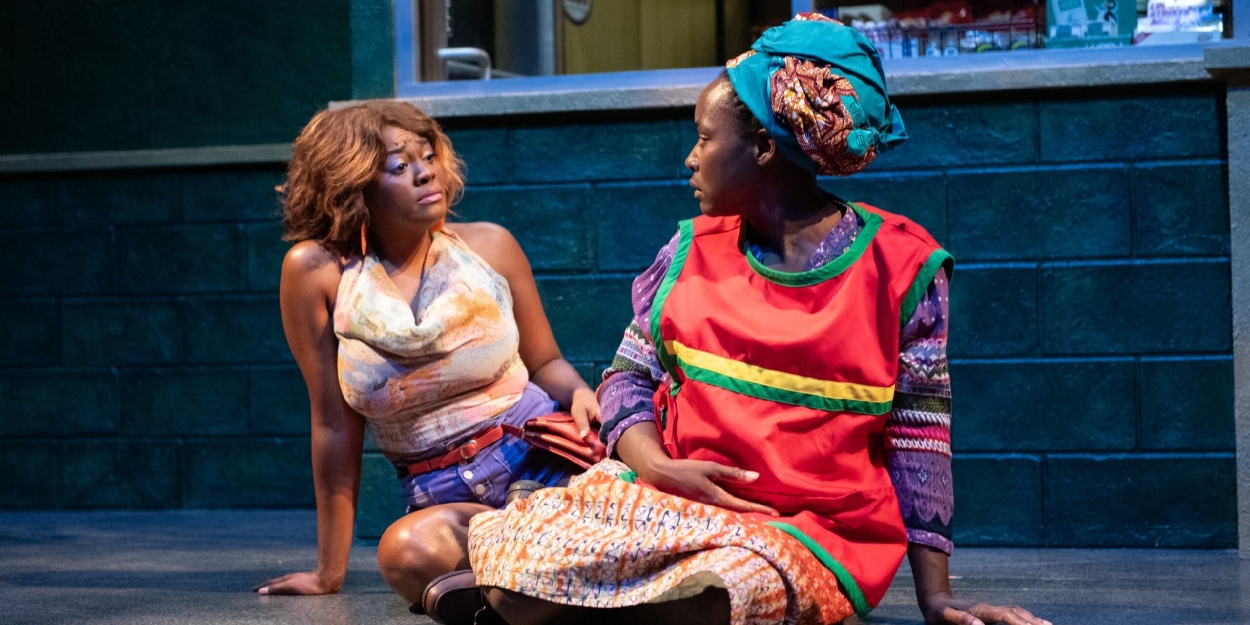
Nigerian ancestry, and American ideals clash, merge, and play off each other in Sojourners by playwright Mfoniso Udofia ---this deeply moving play is part of the epic nine-play Ufot Cycle which follows a Nigerian American family through many cycles of life and generations. This production, presented by the Round House Theatre, quite obviously portrays ancestral themes/American values/assimilation, etc. but I feel that it concurrently succeeds as a theatrical meditation on how a strong central “survivor” can succeed in a world by intersecting with others to create bonding and community within a broken and challenging environment.
Director Valerie Curtis-Newton directs with an obviously astute sense of the dynamics of human nature and an inherent trust in playwright Mfoniso Udofia’s sensitively written material. Ms. Curtis-Newton directs with a respectful cadence in letting the crucial exposition scenes of each character’s narratives unfold naturally as if in real time (this is a true theatrical victory as all my usual subconscious thoughts as to what would happen next were wonderfully obliterated---every development felt like an authentic surprise).
As I got to know each of the characters and the play progressed, I was continually absorbed as each scene played out in the utter reality of a clock ticking ---as in reality. No moment felt rushed or hyped-up for dramatic effect. Each scene created an ambience of its own yet the whole production left me with a sense of connection. The central character of Abasiama, the Nigerian immigrant to America who is facing the triple challenges of keeping a marriage intact, going to school and working as a gas station attendant at night, is played with a steely core and a loving heart underneath by Billie Krishawn. Ms. Krishawn holds the play together with the bubbling undercurrents of personality that percolate underneath her character’s surface. As the end of the play approached, the slamming of the door by Ms. Krishawn conveyed the newly strengthened agency and empowerment of Abasiama’s character and made me eager to see the other plays in the Ufot Cycle.
Throughout the play, Ms. Krishawn’s character would interact with the initially belligerent Moxie (an amazingly fluid and disarming performance from Renea S. Brown) only to discover that the streetwise character of Moxie is desperate, vulnerable, and looking for acceptance. Ms. Brown transitioned with pure immediacy and spontaneity from defensive to comically caustic to authenticity as her character realizes that life has more to offer than she thought. A knockout performance!
Female bonding (between the characters of Ms. Krishawn and Ms. Brown) and the brokenness of the human condition healed by interacting with others who you may not immediately feel a connection to –i.e.: “being a human being” to those who initially feel different from you --are highlighted in several scenes, especially a scene of bonding between Krishawn’s character (Abasiama) and Brown’s character (Moxie) in a hospital setting that moved me to tears.
Opa Adeyemo sharply etches a detailed portrait of Abasiama’s husband Ukpong. Mr. Adeyemo conveys a character who is caught up in his idealized dream of America --while not taking the time to balance his idealism by sharing emotionally with his wife’s struggles and her demanding work. Mr. Adeyemo certainly conveyed that his character has not even begun to confront the sober realities of his situation.
The character of Disciple as played by Kambi Gathesha—is that of an arduous student and worker who is the polar opposite of Mr. Adeyemo’s character (Upkong). Scenes with Mr. Gathesha muttering to himself as he worked continually at his desk at his studies were highly memorable. Playwright Udofia has certainly created an interesting, eccentric, and highly responsible portrait of a character. Mr. Gathesha’s acting as he confessed his desire to love and be responsible for Abasiama was a highlight of the play.
In this play the four characters that we see at the beginning of act one are just shown in isolation but soon, as the play progresses, the characters intersect through happenstance, and they begin to reach out to one another through their own individual circumstances and pain. (This evolution of the characters through intersection and connection is aided by the revolving set which efficiently compartmentalizes the various sharply delineated scenic designs by Paige Hathaway. Ms. Hathaway created a home living room/kitchen design, a gas station’s shop, a study, and a hospital room).
Costume design by Ivania Stack, lighting design by Porsche McGovern and sound design by Kenny Neal were all exemplary.
There was a palpable sweetness of heart and mind underneath the despair and a continually intriguing intermeshing of the characters in Mfoniso Udofia’s marvelous play—this insightful playwright possesses a highly original writing style that is equivalent to the writing and complexity in such memorable plays as Angels in America and Six Degrees of Separation.
For a fulfilling sojourn to a place of finding shared bonds and empowerment amidst the chaos, do not miss Sojourners!
Running Time: Two hours and 30 minutes including one intermission
Sojourners runs through October 6, 2024, at the Round House Theatre located at 4545 East-West Highway, Bethesda, MD.
Photo credit: Renea S. Brown, and Billie Krishawn in Round House Theatre's production of Sojourners. Photo by Margot Schulman Photography.
Reader Reviews

Videos

